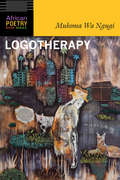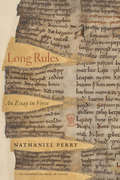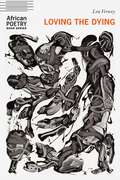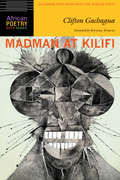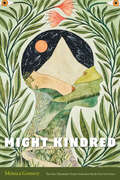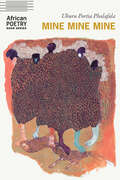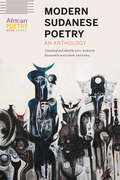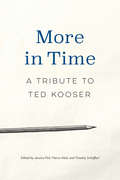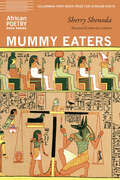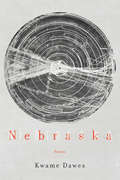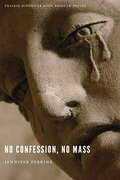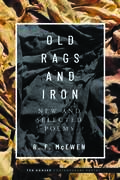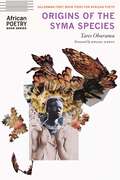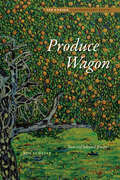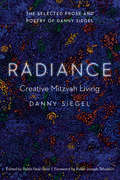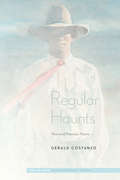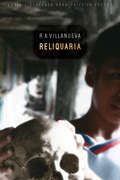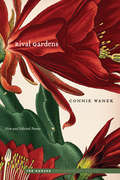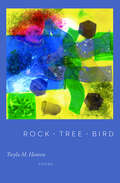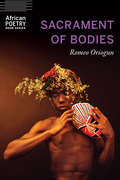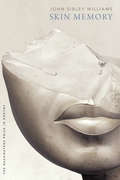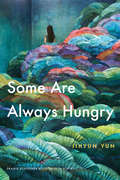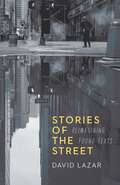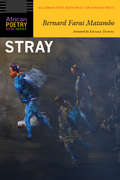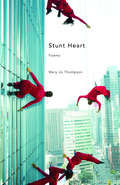- Table View
- List View
Logotherapy (African Poetry Book)
by Mukoma Wa NgugiWritten as a tribute to family, place, and bodily awareness, Mukoma Wa Ngugi’s poems speak of love, war, violence, language, immigration, and exile. From a baby girl’s penchant for her parents’ keys to a warrior’s hunt for words, Wa Ngugi’s poems move back and forth between the personal and the political. In the frozen tundra of Wisconsin, the biting winds of Boston, and the heat of Nairobi, Wa Ngugi is always mindful of his physical experience of the environment. Ultimately it is among multiple homes, nations, and identities that he finds an uneasy peace.
Long Rules: An Essay in Verse (The Backwaters Prize in Poetry)
by Nathaniel PerryA book-length poem in six sections, Long Rules takes readers to five Trappist monasteries in the southeastern United States to consider the intersections of solitude, family, music, and landscape. Its lines unspool in a loose and echoing blank verse that investigates monastic rules, sunlight, Saint Basil, turnips, Thomas Merton, saddle-backed caterpillars, John Prine, fatherhood, and everything in between. Looking inside and outside the self, Perry asks, what, or whom, are we serving? Winner of the Backwaters Prize in Poetry, this essay in verse contemplates the meaning of solitude and its contemporary ramifications in a time of uncertainty.
Loving the Dying (African Poetry Book)
by Len VerweyLoving the Dying is a collection of poems on life&’s different stages. Set against the backdrop of a conflicted society, Len Verwey looks at a person&’s life from youth and growing up to aging and dying, considering what the ineluctable reality of death might imply about how we should think about our lives. These are poems of uncertainty rather than certainty. The more overtly biographical ones end with as many questions as they start with, and there is often sympathy for the outsider or the marginalized voice. Varying in tone and complexity, Verwey&’s poems focus on the tension between escapism and reality, truth and delusion (for individuals and societies), and the need to face death if we are to care for the aged and learn to understand the process of dying. As in his first poetry collection, In a Language That You Know, Verwey continues his effort to understand the successes and failures of the South African post-apartheid journey, with both humor and some despair.
Madman at Kilifi (African Poetry Book)
by Clifton GachaguaClifton Gachagua’s collection Madman at Kilifi, winner of the Sillerman First Book Prize for African Poets, concerns itself with the immediacy of cultures in flux, cybercommunication and the language of consumerism, polyglot politics and intrigue, sexual ambivalence and studied whimsy, and the mind of a sensitive, intelligent, and curious poet who stands in the midst of it all. Gachagua’s is a world fully grounded in the postmodern Kenyan cultural cauldron, a world in which people speak with “satellite mouths,” with bodies that are “singing machines,” and in which the most we can do is “collide against each other.” Here light is graceful, and we glow like undiscovered galaxies and shifting matter. And here as well, we find new expression in a poetry that moves as we do.
Might Kindred (The Raz/Shumaker Prairie Schooner Book Prize in Poetry)
by Mónica GomeryThe poems of Might Kindred wonder aloud: can we belong to one another, and &“can a people belong to a dreaming machine?&” Conjuring mountains and bodies of water, queer and immigrant poetics, beloveds both human and animal, Mónica Gomery explores the intimately personal and the possibility of a collective voice. Here anthems are sung and fall apart midsong. The speaker exchanges letters with her ancestors, is visited by a shadow sister, and interrogates what it means to make a home as a first-generation American. Winner of the Raz/Shumaker Prairie Schooner Book Prize in Poetry, the poems in Might Kindred are rooted in the body and its cousins, seeking the possibility of kinship, &“in case we might kindness, might ardor together.&” Belonging and unbelonging are claimed as part of the same complicated whole, and Gomery&’s intersections reach for something divine at the center.
Mine Mine Mine (African Poetry Book)
by Uhuru Portia PhalafalaMine Mine Mine is a personal narration of Uhuru Portia Phalafala&’s family&’s experience of the migrant labor system brought on by the gold mining industry in Johannesburg, South Africa. Using geopoetics to map geopolitics, Phalafala follows the death of her grandfather during a historic juncture in 2018, when a silicosis class action lawsuit against the mining industry in South Africa was settled in favor of the miners. Phalafala ties the catastrophic effects of gold mining on the miners and the environment in Johannesburg to the destruction of Black lives, the institution of the Black family, and Black sociality. Her epic poem addresses racial capitalism, bringing together histories of the transatlantic and trans-Indian slave trades, of plantation economies, and of mining and prison-industrial complexes. As inheritor of the migrant labor lineage, she uses her experience to explore how Black women carry intergenerational trauma of racial capitalism in their bodies and intersects the personal and national, continental and diasporic narration of this history within a critical race framework.
Modern Sudanese Poetry: An Anthology (African Poetry Book)
by Adil BabikirSpanning more than six decades of Sudan’s post-independence history, this collection features work by some of Sudan’s most renowned modern poets, largely unknown in the United States. Adil Babikir’s extensive introduction provides a conceptual framework to help the English reader understand the cultural context. Translated from Arabic, the collection addresses a wide range of themes—identity, love, politics, Sufism, patriotism, war, and philosophy—capturing the evolution of Sudan’s modern history and cultural intersections.Modern Sudanese Poetry features voices as diverse as the country’s ethnic, cultural, and natural composition. By bringing these voices together, Babikir provides a glimpse of Sudan’s poetry scene as well as the country’s modern history and post-independence trajectory.
More in Time: A Tribute to Ted Kooser
by Timothy Schaffert Marco Abel Jessica PoliMore in Time is a celebration and tribute to Ted Kooser, two-time U.S. Poet Laureate, winner of the Pulitzer Prize for Poetry, and Presidential Professor of the University of Nebraska. Through personal reflections, essays, and creative works both inspired by and dedicated to Kooser, this collection shines a light on the many ways the midwestern poet has affected others as a teacher, mentor, colleague, and friend, as well as a fellow writer and observer-of-the-world. The creative responses included in this volume are reflective of the impact Kooser has had in his connections to other writers, while also revealing glimpses of his distinct way of seeing.
Mummy Eaters (African Poetry Book)
by Sherry ShenodaWinner of the Sillerman First Book Prize for African Poets, Sherry Shenoda&’s collection Mummy Eaters follows in the footsteps of an imagined ancestor, one of the daughters of the house of Akhenaten in the Eighteenth Dynasty, Egypt. Shenoda forges an imagined path through her ancestor&’s mummification and journey to the afterlife. Parallel to this exploration run the implications of colonialism on her passage. The mythology of the ancient Egyptians was oriented toward resurrection through the preservation of the human body in mummification. Shenoda juxtaposes this reverence for the human body as sacred matter and a pathway to eternal life with the sixteenth- and seventeenth-century European fascination with ingesting Egyptian human remains as medicine and using exhumed Egyptian mummies as paper, paint, and fertilizer. Today Egyptian human remains are displayed in museums. Much of Mummy Eaters is written as a call and response, in the Coptic tradition, between the imagined ancestor and the author as descendant.
Nebraska: Poems
by Kwame DawesKwame Dawes is not a native Nebraskan. Born in Ghana, he later moved to Jamaica, where he spent most of his childhood and early adulthood. In 1992 he relocated to the United States and eventually found himself an American living in Lincoln, Nebraska. In Nebraska, this beautiful and evocative collection of poems, Dawes explores a theme constant in his work—the intersection of memory, home, and artistic invention. The poems, set against the backdrop of Nebraska’s discrete cycle of seasons, are meditative even as they search for a sense of place in a new landscape. While he shovels snow or walks in the bitter cold to his car, he is engulfed with memories of Kingston, yet when he travels, he finds himself longing for the open space of the plains and the first snowfall. With a strong sense of place and haunting memories, Dawes grapples with life in Nebraska as a transplant.
No Confession, No Mass (Prairie Schooner Book Prize in Poetry)
by Jennifer PerrineWhether exploring the porous borders between sin and virtue or examining the lives of saints and mystics to find the human experiences in stories of the divine, the poems in No Confession, No Mass move toward restoration and reunion.Jennifer Perrine’s poems ask what healing might be possible in the face of sexual and gendered violence worldwide—in New Delhi, in Steubenville, in Juárez, and in neighborhoods and homes never named in the news. The book reflects on our own complicity in violence, “not confessing, but unearthing” former selves who were brutal and brutalized—and treating them with compassion. As the poems work through these seeming paradoxes, they also find joy, celebrating transformations and second chances, whether after the failure of a marriage, the return of a reluctant soldier from war, or the everyday passage of time.Through the play of language in received forms—abecedarian, sonnet, ballad, ghazal, villanelle, ballade—and in free verse buzzing with assonance, alliteration, and rhyme, these poems sing their resistance to violence in all its forms.
Old Rags and Iron: New and Selected Poems (Ted Kooser Contemporary Poetry)
by R. F. McEwenOld Rags and Iron is a collection of narrative poems about the life experiences of working-class people with whom the author, R. F. McEwen, is not only acquainted but whose lives he has shared. McEwen supplemented his income as a teacher while working as a professional logger and tree trimmer, and he writes with great love and respect for blue-collar families. Set primarily in the back-of-the-yard neighborhood of South Side Chicago, where McEwen grew up, as well as Pine Ridge, South Dakota, western Nebraska, Ireland, and elsewhere, the poems celebrate many voices and stories. Utilizing tree-trimming as a central metaphor, these poems of blank verse fictions reverberate like truth.
Origins of the Syma Species (African Poetry Book)
by Tares OburumuWinner of the Sillerman First Book Prize for African Poets Winner of the Sillerman First Book Prize for African Poets, Tares Oburumu&’s collection is a brief history of where he came from: Syma, a neglected oil-producing region of Nigeria. After growing up with a single mother in the creek- and brook-marked region, and himself now a single parent, Oburumu examines single parenthood and how love defines family circles. Mixing music, religion, and political critique, Origins of the Syma Species evokes pasts and futures. Inspired by the relative chaos found in the origin of things, Oburumu&’s poems explore how the beauty of chaos binds us to our ancestral roots. In his poems Oburumu identifies with anyone who is a single parent or is dealing with the lonely trauma of a broken home. His poems instill hopefulness in a world that has the means to throw many into poverty and agony.
Produce Wagon: New and Selected Poems (Ted Kooser Contemporary Poetry)
by Roy ScheeleThe poems in Produce Wagon explore the vast and varied circumstances of the human experience. Roy Scheele delves into his love for his wife in &“Remembrances,&” the opening poem from his first chapbook, and &“Driving after Dark&”; his fascination with the natural world in poems such as &“How the Fox Got Away&” and &“Late Autumn Woods&”; his appreciation of his family in &“A Kitchen Memory&” and &“The Long Rise&”; and his fondness for stories in &“The Carny Circuit&” and &“In the Clear.&” In these and the other poems in the collection, Scheele uses a variety of traditional verse forms as well as free verse and syllabics, carefully fitting the form of each poem to his subject matter. Though most of the poems are set in Nebraska and neighboring states, there is a universality to the subjects Scheele addresses. In these poems anywhere is everywhere.
Radiance: Creative Mitzvah Living
by Danny SiegelThe Selected Prose and Poetry of Danny Siegel This first anthology of the most important writings by Danny Siegel, spanning and renewing fifty years of his insights intersperses soulful Jewish texts with innovative Mitzvah ideas to rouse individuals and communities to transform our lives, communities, neighborhoods, and world. As a renowned teacher Siegel describes the creative—often startling—ways individuals from different walks of life have brought compassion into the world, recognizes them as Mitzvah heroes, and suggests how we can apply their life lessons. He also plumbs how giving enriches living and presents Jewishly informed best principles for doing more world repair (Tikkun Olam). As a scholar of rabbinic literature Siegel offers translations and commentaries on Jewish texts illuminating Tzedakah, values, caring, and leadership. In addition he tops off a half-century of his thought with five new essays reflecting on his visions for a better world. The selected poetry asks religious and theological questions in the face of oppression and war, gives voice to personal moments often neglected by ritual, and exults at the wonders of modern Israel and the revelation of love. Both inspirational and pragmatic, this anthology offers practical guidance on using Siegel&’s classic and novel works in personal living and in Jewish organizational settings. Ultimately, in exploring the dynamic interaction between heroes, texts, and ourselves, Siegel seeks to engage each of us in discovering our own radiant potential for creative Mitzvah living.
Regular Haunts: New and Previous Poems (Ted Kooser Contemporary Poetry)
by Ted Kooser Gerald CostanzoGerald Costanzo, long known as one of the best contemporary poets of satire, focuses specifically on American themes that, though presented as parables, fables, jokes, and put-ons, remain darkly serious in tone. His subject is the mythic landscape of America itself: the transitory, popular, consumer culture of late twentieth- and early twenty-first-century life. Costanzo evokes a sense of having arrived on the scene too late, of having missed the heyday of American innocence and possibility, and now—in the present—is forced to live with diminished experience. He mourns a culture where genuine emotion cannot be found but where its semblance can be endlessly marketed. Regular Haunts is a retrospective collection of Costanzo’s work that also includes nearly thirty new poems.
Reliquaria (Prairie Schooner Book Prize in Poetry)
by R. A. VillanuevaIn his prize-winning poetry collection Reliquaria, R. A. Villanueva embraces liminal, in-between spaces in considering an ever-evolving Filipino American identity. Languages and cultures collide; mythologies and faiths echo and resound. Part haunting, part prayer, part prophecy, these poems resonate with the voices of the dead and those who remember them. In this remarkable book, we enter the vessel of memory, the vessel of the body. The dead act as witness, the living as chimera, and we learn that whatever the state of the body, this much rings true: every ode is an elegy; each elegy is always an ode.
Rival Gardens: New and Selected Poems (Ted Kooser Contemporary Poetry)
by Ted Kooser Connie WanekFor decades a restorer of old homes, Connie Wanek shows us that poetry is everywhere, encountered as easily in the waterways, landscapes, and winters of Minnesota, as in the old roofs and darkened drawers of a home long uninhabited. Rival Gardens includes more than thirty unpublished poems, along with poems selected from three previous books—all in Wanek’s unmistakable voice: plainspoken and elegant, unassuming and wise, observant and original. Many of her new poems focus on the garden, beginning with the Garden of Eden. A deep feeling for family and for the losses and gains of growing into maturity mark the tone of Rival Gardens, with Wanek always attending to the telling detail and the natural world.
Rock Tree Bird
by Twyla M. Hansen2018 Nebraska Book Award This collection of poems by the State Poet of Nebraska covers significant emotional territory while remaining firmly grounded in the landscape. From memories of the isolation and beauty of growing up on a farm, to a burgeoning awareness as a teenager of the economic and cultural forces waged against family farming, to coming to terms with the legacies of her parents after their passing, and, finally, arriving at an appreciation of nature and the environment wherever and whenever she finds it, Twyla M. Hansen offers poems that are alternately sad, sweet, funny, moving, human, and humane.
Sacrament of Bodies (African Poetry Book)
by Romeo OriogunIn this groundbreaking collection of poems, Sacrament of Bodies, Romeo Oriogun fearlessly interrogates how a queer man in Nigeria can heal in a society where everything is designed to prevent such restoration. With honesty, precision, tenderness of detail, and a light touch, Oriogun explores grief and how the body finds survival through migration.
Skin Memory (The Backwaters Prize in Poetry)
by John Sibley WilliamsA stark, visceral collection of free verse and prose poetry, Skin Memory scours a wild landscape haunted by personal tragedy and the cruel consequences of human acts in search of tenderness and regeneration. In this book of daring and introspection, John Sibley Williams considers the capriciousness of youth, the terrifying loss of cultural identity and self-identity, and what it means to live in an imperfect world. He reveals each body as made up of all bodies, histories, and shared dreams of the future. In these poems absence can be held, the body&’s dust is just dust, and though childhood is but a poorly edited memory and even our well-intentioned gestures tend toward ruin, Williams nonetheless says, &“I&’m pretty sure, everything within us says something beautiful.&”
Some Are Always Hungry (Prairie Schooner Book Prize in Poetry)
by Jihyun YunWinner of the Prairie Schooner Book Prize in Poetry, Some Are Always Hungry chronicles a family&’s wartime survival, immigration, and heirloom trauma through the lens of food, or the lack thereof. Through the vehicle of recipe, butchery, and dinner table poems, the collection negotiates the myriad ways diasporic communities comfort and name themselves in other nations, as well as the ways cuisine is inextricably linked to occupation, transmission, and survival. Dwelling on the personal as much as the historical, Some Are Always Hungry traces the lineage of the speaker&’s place in history and diaspora through mythmaking and cooking, which is to say, conjuring.
Stories of the Street: Reimagining Found Texts
by David LazarWhen walking down the street, it is not uncommon to see lost items that have escaped their proper receptacles, but how often does one stop to read the messages left behind? David Lazar has stopped often, capturing the pieces of a &“lost world on the streets&” and thinking about the life of the discarder from the fragments left behind.Stories of the Street is a series of imaginative meditations—through prose poems, short-short essays, microfictions, and prose pieces without precise genre distinction—of what it means to encounter lost or discarded texts. Rather than simply deconstructing the lists, notes, receipts, or book pages he finds strewn in various cities, Lazar uses them as suggestive, capable of inspiring possible narratives that are at most latent in the text itself. The encounter, then, is an encounter with oneself and the mysteries of cities, where detritus frequently doubles as a sign saying, &“Consider this.&” Lazar&’s narrative voice ranges in tone from the comically antic to the melancholy. By photographing what he describes as &“messages that had escaped their bottles&” on-location as found, Lazar has become a flaneur of paper debris, puzzling over the evidence of urban human life.
Stray (African Poetry Book)
by Kwame Dawes Bernard Farai MatamboWinner of the Sillerman First Book Prize for African Poets, Zimbabwean writer Bernard Farai Matambo’s poems in Stray favor a prose-shaped line as they uncover the contradictory impulses in search of emotional and intellectual truth. Stray not only captures the essence of identity but also eloquently articulates the pain of displacement and speaks to the vulnerability of Africans who have left their native continent. This collection delicately examines the theme of migration—migration in a literal, geographic sense; migration of language from one lexicon to another; migration of a poem toward prose—and the instability of the creative experience in the broader sense.
Stunt Heart (The Backwaters Prize in Poetry)
by Mary Jo ThompsonIn Stunt Heart, Mary Jo Thompson’s debut collection,a female gaze locates the ironies inside the subjects of marriage and death, loneliness and love, speaking and silence. The title plays on both sick hearts and circus tricks, and appropriately, these poems are direct, personal, and disarmingly emotive. Look at the end of the first poem, “Says Penelope,” where the speaker suddenly veers to “Newsflash: I sleep- / walk.” These stark moments of admission are used to perfection in the centerpiece sonnet series, “Thirteen Months,” the collection’s highlight. Distilled emotion over the illness and death of an estranged husband ranges in tone from the dark humor that compares the marriage to a used car to the elegiac imagery of protecting the family garden from frost. The shock of seeing the deceased in his casket looking like a cross between Clark Gable and Dracula seasons the collection, recurring in ruminations on the various ways a body is prepared at death and the story of a mother who dies while sneezing. Although no one brings back the dead by writing poetry, in Stunt Heart,Thompson revisits them with credible humor and tough dispatches from bedrooms, graveyards, and hospital hallways. Thompson’s Stunt Heart jukes, dodges, and prays while muscling through all manners of demise and in the process reveals how one can turn grief into speech, art into grieving.
